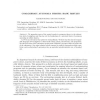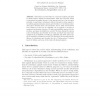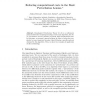2043 search results - page 6 / 409 » Some Basics on Tolerances |
CORR
2008
Springer
13 years 8 months ago
2008
Springer
Abstract. We generalize some of the central results in automata theory to the abstraction level of coalgebras and thus lay out the foundations of a universal theory of automata ope...
ESORICS
2004
Springer
14 years 1 months ago
2004
Springer
Redundancy and diversity are commonly applied principles for fault tolerance against accidental faults. Their use in security, which is attracting increasing interest, is less gene...
ENGL
2007
13 years 8 months ago
2007
— The tolerance design directly influences the functionality of products and production costs. Tolerance synthesis is a procedure that distributes assembly tolerances between com...
IFSA
2007
Springer
14 years 2 months ago
2007
Springer
In the formal and fully graded setting of Fuzzy Class Theory (or higher-order fuzzy logic) we make an initial investigation into basic notions of fuzzy topology. In particular we s...
CASC
2006
Springer
14 years 4 days ago
2006
Springer
Homological Perturbation Theory [11, 13] is a well-known general method for computing homology, but its main algorithm, the Basic Perturbation Lemma, presents, in general, high com...



